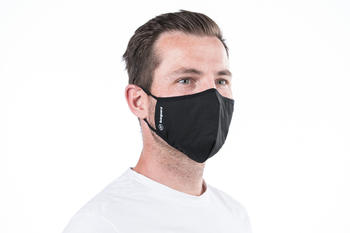Innovative textiles for face masks can directly inactivate SARS-CoV-2, researchers from Freie Universität Berlin and RWTH Aachen University show
№ 096/2020 from Jun 10, 2020
Researchers at the Institute for Animal and Environmental Hygiene of Freie Universität Berlin and the Institut für Textiltechnik (ITA) of RWTH Aachen University are collaborating on the topic of alternative personal protection equipment. The testing was conducted in the context of the EIT Health Project ViruShield, supported by the European Union, with the objective of discovering alternative filter materials for face masks in light of tight supply and globally imbalanced supply chains for personal protective equipment.
The Swiss company Livinguard has developed a treatment for textile facial masks that can directly inactivate bacteria and viruses. While researchers at the Institut für Textiltechnik (ITA) of RWTH Aachen University conducted experiments on the chemical and physical properties of various textiles for face masks, researchers at Freie Universität Berlin were able to demonstrate that these new textiles can reduce high amounts of SARS-CoV-2 virus particles by up to 99.9% within a few hours.
“The textiles in these masks can thus continuously inactivate the exhaled viruses and can make handling these masks even safer overall,” says Professor Dr. Uwe Rösler from the Institute for Animal and Environmental Hygiene. “In addition, such textiles could also help to reduce hygienic issues in other general and medical areas, even beyond Covid-19.” However, no investigation was carried out by the Institute for Animal and Environmental Hygiene on the filtering properties of the textiles in relation to aerosols containing virus particles, and such an investigation did not form part of the research project.
The novel coronavirus SARS-CoV-2 can be transmitted through airborne droplets and aerosols. For this reason, governments and health authorities worldwide, including the Wolrd Health Organization (WHO), recommend wearing face masks to protect other people and, to a small extent, oneself. Face masks with an appropriate level of filtration (e.g., surgical masks covering mouth and nose or FFP2/FFP3) can hold back SARS-CoV-2-containing droplets that occur when you exhale, speak, cough, or sneeze.
However, great care must be taken when handling contaminated face masks. After use, either the masks must be disposed of, or the viruses can be inactivated by washing at higher temperatures or by microwave treatment.
The principle underlying the Livinguard technology is that a textile surface is given a strong positive charge. When negatively-charged virus or bacteria microbes come into contact with the charged surface, the microbe cell is destroyed, leading to permanent destruction of the infectious microorganism. Unlike alternative metal-based solutions, this innovative technology has been found to be safe for both skin and lungs. Livinguard Technology is also sustainable, allowing users to reuse the mask up to 200 times with no reduced impact on safety or efficacy.
This press release was amended and updated on January 25, 2021.
Further Information
Questions in relation to the mask and its efficacy as a filter for aerosols (e.g., compared to surgical masks or FFP2) should be addressed to Livinguard. Professor Rösler only tested the antiviral efficacy of the textile used to make the mask. He is not able to provide any information on regulatory issues nor on the filtration properties of the mask, as these were not tested by the Institute for Animal and Environmental Hygiene.
Please therefore address any such questions to:
Victoria Banaszak, Livinguard, Tel.: +41 41 726 16 76, Email: victoria.banaszak@livinguard.com

